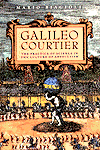 |
 |
Books By Peter Galison
 |
How Experiments End
"Our task is...to look inside the laboratory to understand how tems of physicists mount a case for the existence of a process that takes place in a hundred-millionth of a second and looks like ten other processes." - from Preface |
 |
Big Science: The Growth of Large-Scale Research, with Bruce Hevly
"This book will be of great interest to historians, physicists, economists, engineers, and policymakers alike....Sometimes the surrounding American industry stimulated new developments in academic physics departments in the U.S. rather than the other way about. Those who wish to study the complexity of these interrelationships, which are still evolving and changing, can do no better than to read this exciting and thought-provoking book." - Physics World |
 |
The Disunity of Science, with David Stump
"This is a very important work, with contributions by many of the most prominent scholars in science studies. What is most impressive about the volume is that it actually delivers on its promise to renew discussion and develop fresh ideas about the allegation that the sciences are no longer (or never were) unified by a single theoretical view of nature or a methodological foundation. It will be a valuable source for years to come for scholars and students of the philosophy, history, and sociology of science, and of the humanities and social sciences as well." -- Michael Lynch |
| Picturing Science, Producing Art, with Caroline Jones
...the boundaries between science and art will not hold. Foraging within this hotly contested zone, the internationally renowned contributors to Picturing Science, Producing Art analyze both scientific and aesthetic representations, utilizing disciplinary perspectives that range from art history to sciology, history, philosophy of science, gender studies, cultural history, and the philosophy of mind. |
|
 |
The Architecture of Science, with Emily Thompson |
 |
Image and Logic: A Material Culture of Modern Physics |
Books Recommended By Peter Galison
 |
Structure of Scientific Revolutions, by Thomas Kuhn
"Perhaps the best explanation of [the] process of discovery."--William Erwin Thompson, New York Times Book Review "A landmark in intellectual history which has attracted attention far beyond its own immediate field. . . . It is written with a combination of depth and clarity that make it an almost unbroken series of aphorisms. . . . Kuhn does not permit truth to be a criterion of scientific theories, he would presumably not claim his own theory to be true. But if causing a revolution is the hallmark of a superior paradigm, [this book] has been a resounding success." --Nicholas Wade, Science |
 |
Thematic Origins of Scientific Thought, by Gerald Holton
"Thematic Origins is a brilliant explanation of the true, powerful processor of scientific thought. The original is one of the few works of the history and philosophy of science I have read and reread over the years, and I am especially pleased now to see this even stronger revision. Holto stands almost alone in his ambidextrous ability to decide - and write - as both a scientist and philosopher." - E.O. Wilson, Harvard University |
 |
Galileo, Courtier, by Mario Bigaioli
In the court of the Medicis and the Vatican, Galileo fashioned both his career and his science to the demands of patronage and its complex systems of wealth, power, and prestige. In this fascinating cultural and social history of science, Biagioli argues that Galileo's courtly role was integral to his science - the questions he chose to examine, his methods, even his conclusions. |
 |
No Magic Bullet, by Allan M. Brandt
"An audacious examination of American attitudes toward sexually transmitted disease...A chilling reminder of a forgotten history." - Village Voice |
 |
Wonders and the Order of Nature, by Lorraine Daston and Katherine Park
Wonders and the Order of Nature is about the ways in which European naturalists from the High Middle Ages through the Enlightenment used wonder and wonders, the passion and its objects, to envision themselves and the natural world. |
 |
The Pasteurization of France, by Bruno Latour
Although every town in France has a street named for Pasteur, was he alone able to stop people from spitting, persuade them to dig drains, influence them to undergo vaccination? Pasteur's success depended on a whole network of forces, including the public hygiene movement, the medical profession (both military physicians and privaet practitioners), and colonial interests. It is the operation of these forces, in combination with the talent of Pasteur, that Bruno Latour sets before us as a prime example of science in action. |
 |
Leviathan and the Air-Pump, by Steven Shapin & Simon Schaffer
"Shapin and Schaffer work out the implications of these debates [between Hobbes and Boyle] for the history of science with great skill of interpretation and exposition. They use their findings and their analysis to give an explanation of the experimental enterprise in general, which, although it is not philosophical in nature, always takes philosophy most seriously. This is simply one of the most original, enjoyable and important books published in the history of science in recent years." - Owen Hannaway, Technology and Culture |
 |
Principia, by Sir Isaac Newton |
| The Great Devonian Controversy, by Martin J.S. Rudwick |
Copyright 2000 Harvard Book Store Phone: 800-542-READ FAX: 617-497-1158